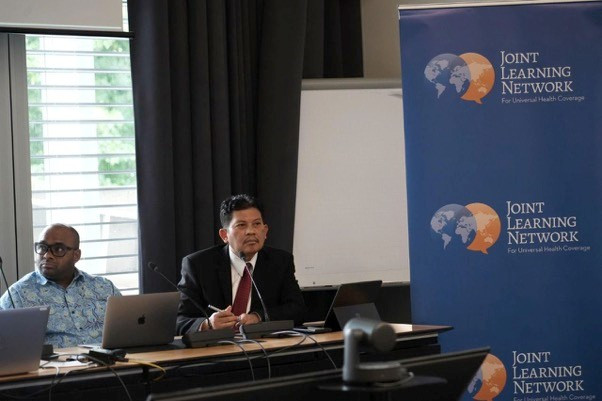Popular Reads
Top Results
Can't find what you're looking for?
View all search resultsPopular Reads
Top Results
Can't find what you're looking for?
View all search resultsBPJS Kesehatan showcases innovative financing strategies at World Health Assembly
Change text size
Gift Premium Articles
to Anyone
I
ndonesia’s Health Care and Social Security Agency (BPJS Kesehatan) mounted the global stage at the 78th World Health Assembly in Geneva, Switzerland, highlighting innovative strategies in financing its national health insurance (JKN) program.
Appearing as the main speaker in a panel discussion during the event, BPJS Kesehatan president director Ghufron Mukti shared Indonesia’s success in implementing domestic resource mobilization (DRM) to achieve universal health coverage, emphasizing the importance of domestic financial independence in the health sector.
Indonesia, he said, had proven that sustaining national health financing was possible through transparent management and robust governance without overreliance on foreign aid.
“As of May 16, 2025, the JKN program has covered 279.9 million people, [or] 98.25 percent of the total population, making it one of the world’s largest and most inclusive social health insurance schemes,” Ghufron said.
Healthcare utilization via JKN has grown significantly over the last 11 years, from 92 million visits in 2014 to more than 700 million in 2024. Total healthcare spending during the same period reached Rp 1.087 quadrillion (US$66.59 billion), with severe illnesses like heart disease, cancer and chronic kidney failure accounting for the largest share.
To strengthen funding sources, BPJS Kesehatan has launched several innovations under the DRM framework. These include the JKN Care Fund Community Program, a voluntary donation platform for individuals and corporations, including contributions through corporate social responsibility (CSR), to help participants in the informal sector who are behind on premium payments.
“Between 2021 and March 2025, the program has collected Rp 12.7 billion, supporting over 19,000 JKN members,” Ghufron said.
He also pointed to the strategic use of tobacco tax revenue as a key fiscal instrument: Under a recent government policy, regional administrations are required to allocate 37.5 percent of their incomes from the cigarette tax to the JKN program, and the scheme has been projected to contribute more than Rp 10 trillion in 2024 alone.
To maintain service quality and ensure equitable access to health care, BPJS Kesehatan continues to adopt technological innovations ranging from service digitalization, big data analytics and enhanced data governance to AI-based fraud detection.
“These efforts aim to improve efficiency, transparency and accountability while ensuring fast, fair and nondiscriminatory healthcare services for all,” said Ghufron.










